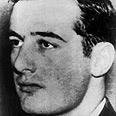
Sweden will open a new probe into what happened to World War II hero Raoul Wallenberg after he was captured by the Soviets in 1945.
Foreign Minister Carl Bildt has asked experts to look into whether any new material has emerged that could shed new light on what happened to the Swedish diplomat, Bildt spokeswoman Anna Charlotta Johansson said Wednesday.
Wallenberg is credited with rescuing tens of thousands of Hungarian Jews from the Nazis. He disappeared after being arrested in Hungary by the Soviet Red Army in 1945.
On Tuesday, Hungary, Sweden and Israel launched the Raoul Wallenberg Year to honor his efforts.
The new Swedish probe will be led by Hans Magnusson, who was involved in a similar effort together with Russian experts in the 1990s.
According to Bildt, the Russian experts then said Wallenberg died, "or more likely was killed," on June 17 1947 in Soviet custody, but unverified witness accounts and newly uncovered evidence suggest he may have lived beyond that date.
The Soviets said he died of a heart attack in prison and Russia has never officially retracted that version. The Swedes haven't contested the Russian version, but have maintained there was insufficient evidence to draw any firm conclusions about Wallenberg's ultimate fate.
On Monday, two US researchers told The Associated Press that a newly found Swedish document shows how the KGB intervened in the early 1990s to stop the previous investigation.
Russian scholar Vadim Birstein, one of the researchers working for the first Wallenberg commission, said they had just found some previously unknown documents when the archive was closed to them in the spring of 1991.
The former head of the Soviet "Special Archive," Anatoly Prokopenko, told the AP that following a brief period of openness before and after the 1991 collapse of the Soviet Union, Russian authorities have grown increasingly reluctant to allow public access to the archives.















